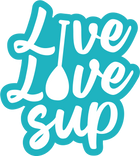Over the years we could not be more proud of all of the stand up paddlers that have come together as Live Love SUP'ers to support charity:water. To date we have fundraised approximately $14,000 and have helped funded clean water projects in 7 different countries including Mali, Malawi, Nepal, Rwanda, Ethiopia, Kenya and Tanzania.
Many of us take the water we drink and even paddle on for granted each and every day with easy access and what seems like an abundant supply compared to the 663 million individuals who dot have access to clean drinking water. 1 in 10 people worldwide live without clean water. Fueled by water, our boards and our body, we just couldn't imagine what it would be like to have to walk 2 hours daily just to get water, which may or may not be clean, in order for our family to survive. This lead to the Live Love SUP charity wristband project as well as events and requests for donations over the years. Many of the water projects that we were able to donate to because of paddler's generosity around the world took up to 18 months to complete.


We've never taken the opportunity to share all of these projects with you and as we kick off on a new road for Live Love SUP, we thought we get caught up on the charity:water proects we have been involved.
People served to date: 3,473
People who now have access to clean water in their villages.
Projects in the following countries: Mali, Malawi, Nepal, Rwanda, Ethiopia, Kenya, Tanzania
A few of our projects we were involved with:
Airasur Ethiopia - Hand Dug Well - 400 people
The people here, especially women and girls, used to walk up to two hours to collect water for their families. The water wasn't safe to drink and often made people sick. Thanks to your help, people here are walking significantly less every day to collect water. Most importantly, the water they bring home each day is safe enough to drink.

Nyalulanga 1 Community Tanzania - Hand Dug Well - 229 People
Thanks to you, this community now has access to clean and safe drinking water. Additionally, our local partners trained community health workers and local leaders to disseminate positive hygiene and household sanitation messages to their respective community members.

